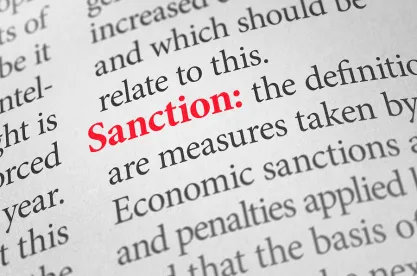Over the past week, the Biden Administration has announced unprecedented sanctions and export controls against Russia in response to its unprovoked invasion of Ukraine. As the State Department pledges an additional $350 million in military and humanitarian support for Ukraine, everyday Americans are wondering how they too can help. While the new sanctions act as a sword against the Russian Federation and a shield for the people of Ukraine, they also pose a minefield for US citizens engaged in international business or seeking to provide humanitarian assistance to Ukraine in its time of need. A misplaced step could lead to civil or criminal enforcement by a variety of agencies responsible for monitoring US exports and international financial transactions. An understanding of the law in this area, and of the agencies that enforce it, can help you help Ukraine while avoiding regulatory action.
Sanctions
The International Emergency Economic Powers Act (IEEPA) empowers the President to impose sanctions if he detects an extraordinary threat to the national security of the United States.1 Once detected, Section 206 prohibits US persons from engaging in any transaction, for goods or services, with a sanctioned individual or entity.2 The Department of Treasury’s Office of Foreign Asset Control (OFAC) is responsible for administering and enforcing US sanctions. Violations are considered strict liability crimes, meaning that even an inadvertent transaction with a sanctioned entity may be subject to OFAC enforcement.
As of March 1, and pursuant to Executive Order 14024, OFAC has imposed extensive sanctions against all ten of Russia’s largest financial institutions as well as a host of Russian nationals with close ties to Putin. The Biden Administration also issued a new Executive Order 14065, which imposed additional sanctions against individuals and entities operating in the DNR and LNR regions of Ukraine.
OFAC has issued a variety of general licenses that exempt certain transactions that would otherwise be prohibited, some of which specifically authorize transactions for humanitarian aid to the designated regions of Ukraine. For instance, General License No. 20 authorizes transactions related to international organizations and entities, including individual donations to the International Committee of the Red Cross. Absent a general license, individuals and entities wishing to do business with designated foreign nationals must apply to OFAC for a specific license.
Export Controls
Even a transaction authorized by OFAC may still be subject to enforcement by the Department of State under the Arms Export Control Act (AECA), or by the Department of Commerce under the Export Administration Regulations (EAR).
The AECA prohibits the export of defense articles, primarily weapons, military equipment, and technology, listed on the U.S. Munitions List (USML) without a license from the Directorate of Defense Trade Controls (DDTC).3 Pursuant to Executive Order 14065, the Biden Administration has suspended all exports of items on the USML as well as all licenses or other approvals to export USML items to Russia, the DNR, and the LNR regions of Ukraine.
The EAR similarly prohibits the export of a variety of commercial items listed on the Commerce Control List (CCL) without prior approval.4 Interestingly, the CCL, rather than the USML, governs the export of certain small arms, such as shotguns with a barrel length of 18 inches or more, muzzle loading rifles and handguns, air guns, and shotgun shells and components. On February 24, the Bureau of Industry and Security (BIS) announced additions to the CCL for end-users in Russia, including bans on the export of semiconductors, computers, telecommunications, information security equipment, lasers, and sensors. BIS also announced a new policy of denying all licenses to export items on the CCL to Russia and Russian-backed separatist regions in Ukraine.
Exports of items on either the USML or the CCL to other regions in Ukraine are allowed but will require a license from the relevant government agency. “Export” is defined broadly to include both an ordinary shipment as well as an in-person export of goods, such as travelling with listed items abroad. To obtain a license to export items on the USML, an individual must register with the DDTC, submit an application, and submit additional documentation describing the commodity and its intended end-use. Obtaining a license for export of items on the CCL follows a similar registration and application process with the BIS.
Assuming no prohibitions in the destination country, items listed on neither the USML nor the CCL, such as basic medical supplies, hygiene products, and single-cell batteries, are free to be exported to Ukraine.
Conclusion
The Biden Administration has warned that these actions are merely the “first tranche” of sanctions and has promised that “Russia will pay an even steeper price if it continues its aggression.” In his first State of the Union address, President Biden followed through on this promise with his announcement of a new Justice Department task force to seize the assets of Russian oligarchs. Accordingly, companies engaged in international business in these regions, as well as individuals wishing to provide humanitarian support, should closely monitor updates to the OFAC sanctions list, the USML, and the CCL to ensure. Failure to do so could result in interagency enforcement as well as steep civil and criminal penalties.
FOOTNOTES
1. 50 U.S.C. § 1701.
2. § 1705(a).
3. 22 U.S.C. § 2778.
4. 15 CFR § 736.2.




 />i
/>i

